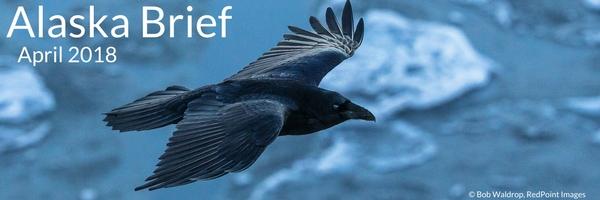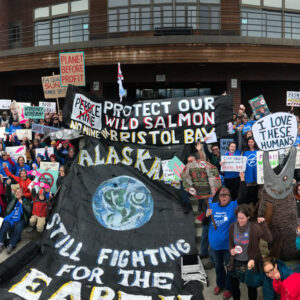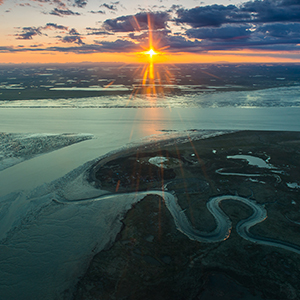Alaska Brief Newsletter–April 2018
The earth is talking to us.
It speaks to us through melting ice and rising sea levels. It shouts out warnings through extreme storms and eroding coastlines. Its voice resonates through droughts, wild fires, and floods.
We need to listen when changes in the land and water force people to leave their homes. We need to pay attention when plants and animals move to higher elevations and higher latitudes to escape the changing climate.
We should heed what science shows us about the past and foretells about the future. Instead, we grapple with decision-makers who deny science and deny the changes taking place before our eyes. We need to give the earth our human voices to protect our communities and future.
Taking our cue from nature
Just as nature keeps speaking out, we must keep speaking out. We must speak out at every public hearing, during every comment period, at every phase of every project that attempts to extract and exploit nonrenewable fossil fuels and minerals at the expense of natural systems and our communities.
Right now in Alaska, we have opportunities to make ourselves heard, and many reasons to speak loudly.
A foreign mining company wants to exploit a bountiful watershed that provides over half the world’s wild sockeye salmon. Pebble Limited Partnership–the Alaska face of Northern Dynasty Minerals of Canada–wants to rush the permit review process. This, after nearly a decade of dragging its feet to submit a permit application in the first place.
Worst yet, the U.S. Army Corps of Engineers is going along by proposing a hurried public input period for the scoping process. Alaskans and some Alaska leaders spoke out against the rush, and pressured the Army Corps to extend the public process.
Time is not enough
Bristol Bay needs more from us than more time. It needs Alaskans to stand up for salmon and the salmon way of life. It needs Americans to speak out on behalf of our connection to and reliance on natural systems.
The Bristol Bay watershed has fed the indigenous people of Bristol Bay for thousands of years. Record salmon runs tell us that if we keep water clean and our land and water ecosystems healthy, they will take care of us.
Speaking for the Arctic
This lesson extends across the state. Soon, Alaskans will also be able to speak out for the Arctic National Wildlife Refuge.
At the end of last year, Congress passed a federal tax bill that included Arctic Refuge oil drilling in a process that lacked debate and transparency. Now, the Interior Department intends to fast-track oil and gas leasing despite the agency’s obligation to comply with environmental laws.
Development in the coastal plain of the Arctic Refuge will endanger the Porcupine Caribou Herd and thousands of migratory birds and animals that use the area as a nursery and refuge. Because the Gwich’in consider the coastal plain “the sacred place where life begins” and know that the caribou depend on that sacred place, they do not go onto those lands. But the caribou herd is the primary food and cultural foundation for the Gwich’in people.
To speak out against drilling in the Arctic Refuge is to speak up for human rights, the stewardship of our public lands, and the voice of nature and everything it teaches us when we listen.
Vicki Clark
Executive Director
PS: Your support of Trustees for Alaska is critical now more than ever.







